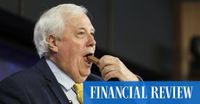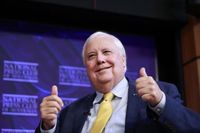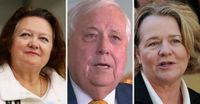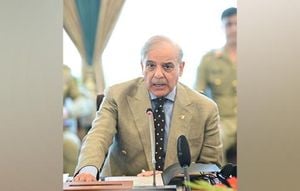As Australia gears up for its upcoming 2025 federal election, mining tycoon Clive Palmer is making headlines once more with the launch of his newly named political party, the Trumpet of Patriots. Known for his controversial and extravagant political ventures, Palmer's admiration for former U.S. President Donald Trump is reflected in the name of his party, which is set to advocate for populist, anti-migrant, and pro-fossil fuel policies, similar to Trump's agenda. At 70, politics has become Palmer's 'golf', he claims, as he invests heavily in promoting his party ahead of what might be a defining election.
Pursuing his ambitions further, Palmer is expected to splash over A$100 million on advertising alone before the election, which is expected to be called within weeks and held in May. In 2022, Palmer's former political entity, the United Australia Party (UAP), won a mere one seat in the Senate despite spending an astonishing A$116 million on electoral advertisements. Comparatively, the major parties invested slightly less; the Liberal-National Coalition and the Labor party spent about A$132 million and A$116 million respectively during the lead-up to that election.
Undeterred by past outcomes, Palmer is taking every opportunity to flood the airwaves with promotions of Trumpet of Patriots, continuing his legacy of substantial investment in political advertising. His party's website explicitly states that “Australia needs Trump-like policies, which only Trumpet of Patriots can deliver.” A flamboyant character, Palmer once famously nodded off in Parliament but previously served as a member of the House of Representatives before stepping back to support candidates of his choosing.
Despite the whirlwind excitement surrounding Palmer’s efforts, the landscape of political funding in Australia is undergoing a major transformation. Recent changes, introduced by the ruling Labor party, aim to cap political donations and enhance transparency amid concerns that wealthy figures might unduly influence electoral processes. Effective from February 12, 2025, new laws establish stringent limits on funding; individual donors can now contribute a maximum of A$50,000 to each candidate or party, a significant reduction from previous uncapped amounts. Donations of A$5,000 or more must be publicly disclosed, and parties are restricted to A$90 million for each campaign.
These reforms, while designed to ensure a fairer electoral process, will not apply to the upcoming election, leaving Palmer's campaign unaffected by the new financial constraints. Nevertheless, prominent figures in the political arena have expressed contrasting views regarding this reform. Palmer has publicly condemned the new laws as threats to democratic freedoms, even considering legal action against them. Meanwhile, electoral funding expert Professor Graeme Orr has labeled the changes as long overdue, noting they will help restore public trust in Australia’s political system.
“This is the most significant reform on disclosure and public funding in Australia in 40 years,” remarked Orr. “We had some of the laxest political campaign and electoral funding laws in the socially democratic world. These laws won’t be a total panacea... but we needed laws like this.”
Supporting the general sentiment of greater transparency, Special Minister of State Don Farrell referred to the reforms as a historic step in tackling the influence of “big money” in Australian politics. Although introduced with an eye toward improving funding transparency, critics, including some influential figures among the “teal independents,” argue that these reforms may inadvertently hand additional advantages to the established major parties. These independents, who prioritize progressive policies and have gained some ground in recent elections, express concerns given their reliance on private donations.
Simon Holmes a Court, a key financier behind these independent candidates, highlighted the struggles they might endure after these reforms. However, the major parties, comprising Labor and the Liberal-National Coalition, generally have a more extensive donor base, potentially making them less vulnerable to the new spending limits.
In 2022, although independent candidates succeeded in capturing eight seats, the major parties dominated, receiving 68 percent of the votes, albeit down from 85 percent in 2007. Palmer's party, on the other hand, garnered minimal support, prompting analysts to predict an uphill battle for Trumpet of Patriots despite the extensive advertising budget Palmer plans to engage.
The age-old dilemma of money influencing politics remains a focal point, with new measures aiming to strike a balance between accessibility for candidates and the potential for undue influence by wealthy donors. Palmer's impending election efforts embody the complexities of this issue, raising questions about fairness in an increasingly competitive landscape.
Already anticipating a tough race, discussions on the viability of independent candidates and their funding dynamics will be critical during this electoral cycle. With the Trumpet of Patriots rallying support and advocating for Trump-like policies, the outcome of this election could redefine not only the parties involved but the broader narrative of Australia's political future.
As campaigning heats up in the lead-up to the May election, Australians watch as Palmer continues to make bold moves, repeating that his party will “make Australia great again.” The juxtaposition between Palmer's extensive campaign financing and new regulatory efforts sets the stage for a dramatic electoral showdown.






